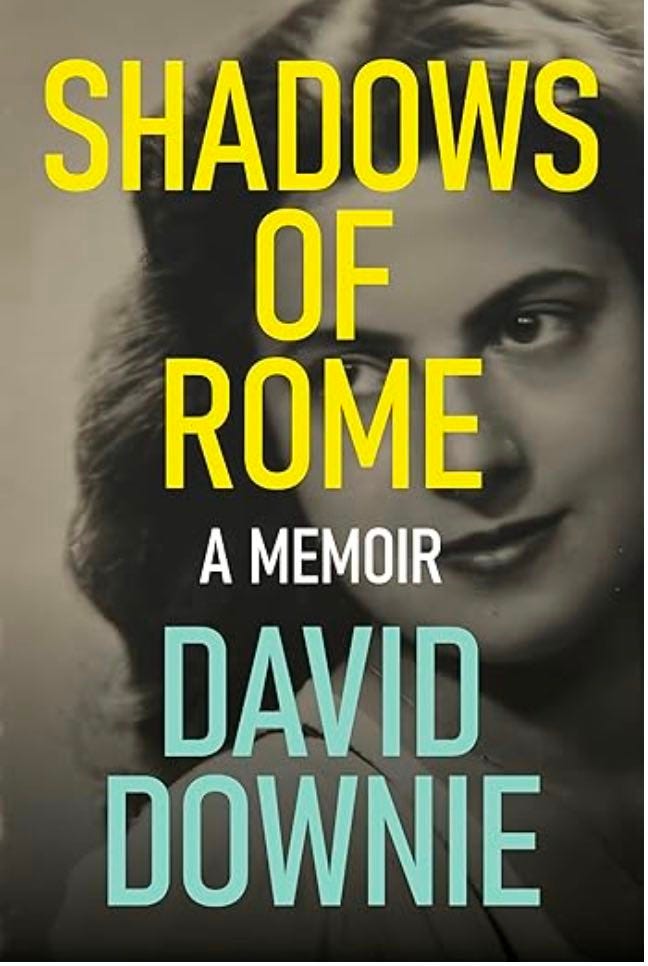A welcome new book from David Downie is a jaunt down memoir lane, Roman style
His family's origin in postwar Rome, his mother-to-be's close encounter with a P-38, and his father's recoil from the excess influence of the CIA
David Downie’s new effort is a true jaunt down memoir lane. It is a hyper-readable tale of his mother, an extroverted Roman teen who ran messages for the Italian resistance; his father, a dispassionate American GI who stayed on after the war to marry her; her complex family in Rome; and the gallery of friends and family she collected in California.
Downie made his mark as a traditionally published writer in the non-fiction world. He then turned to fiction and now is trying his hand (very successfully, in my view) in the tricky land of autobiography. Over the years I've reviewed several of his books and recommend them to you, especially Paris, Paris: Journey into the City of Light, his early love song to the city that became his home.
He was born after the family moved to California at the height of McCarthyism, which forced his mother to renounce her Italian citizenship to avoid affecting her husband’s job on the San Francisco Chronicle.
We first meet Romana Laura Anzi on the streets of Rome. It is 1944 and the Allies are struggling to retake Italy, a campaign that cost them 200,000 casualties. She hasn’t yet met her future husband (how could she? She is dodging a P-38 jockey who is trying to treat her like an arcade game as she goes about carrying Resistance messages).
His father Charles E. Downie was a former Chronicle reporter assigned to signals duty in Rome when he met the dark-eyed teen who, after a courtship of a year and a few months and serious negotiations with Nonno, her father, would become his bride. Nonno is worth a book on his own.
He could stay in Rome because an old friend drafted him to cover sports on Stars & Stripes (rather than shipping out to fight the Japanese), and when that closed he became a founder of the startup Rome Daily American. He stayed there until 1950, when he discovered it was more closely affiliated with the CIA than he found comfortable.
The late 40s were a time of panic on the American political right, much of it McCarthyite over-reaction to the growing left in some European countries. There was a justifiable fear that indigenous communist parties in thrall to Moscow would win postwar elections in Italy and Greece, and to a lesser extent France. The Soviets had rolled up the countries of Eastern Europe, which they kept as tightly controlled satellites until their government collapsed after the Berlin Wall fell.
In any case, Charlie Downie sailed for San Francisco with his wife and young daughter in tow and returned to the Chron. Young David arrived later, but learned little about his father’s wartime adventures. Those tales had to come from his mother, an exuberant artist who didn’t fit in at all well with the tea-sipping white-gloved ladies of San Fran in the 50s.
And now he passes them on to us in his distinctive writing style, one that blends skilled wordsmithing with the ability to pack an impressive amount of information on every page.
David moved to Paris with his wife Alison Harris, a noted photographer. They have divided their time between France and Italy for decades.
(I received a publisher's ARC for the initial read, then purchased the book on publication to complete it.)
The following are links to my reviews of some of his books, which I imported into Substack from Wordpress. The text should be easily readable, but some may lack their graphics.
A passion for Paris: https://parttimeparisian.substack.com/p/another-paris-travel-hit-from-david-downie
The Gardener of Eden: https://parttimeparisian.substack.com/p/book-review-the-gardener-of-eden-by-david-downie
Four of Clubs: https://parttimeparisian.substack.com/p/murder-among-friends-in-the-high-sierra
A Taste of Paris: https://parttimeparisian.substack.com/p/flipped-franc-land-something-worth-swallowing
Read and enjoy
John Pearce
Washington, DC




I agree with all of this, and am in the process of reading the book myself. One thing not mentioned here that I really love about Downie's writing is how he brings his readers along with him on whatever journey he is on. You don't just learn about the *things* he learns when he visits his mother's ancestors home village; you experience the rainstorm he and his wife drove through on tricky Alpine roads to get there, and are right there by his side when the proprietor of a little cafe they are eating in bursts into tears when he learns about the familial connection between himself and Downie. It is a very intimate reading experience as well as an always informative one.